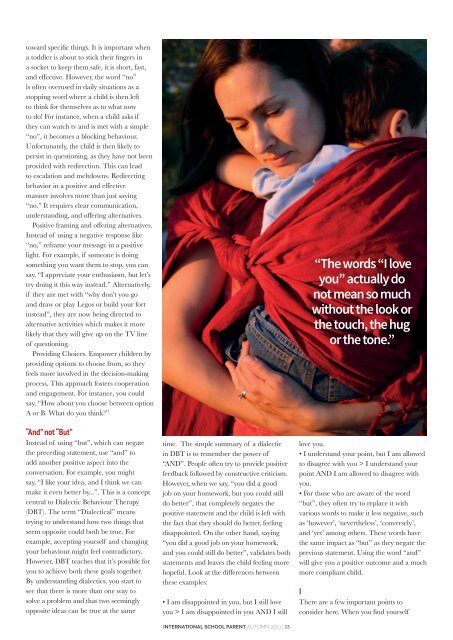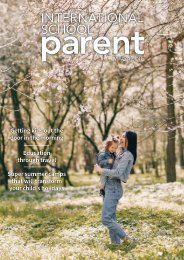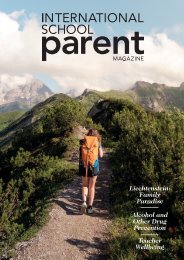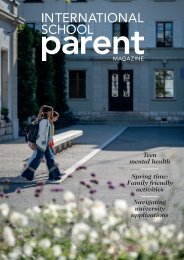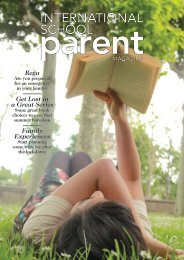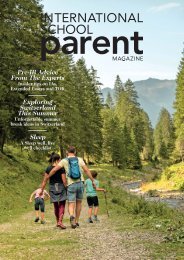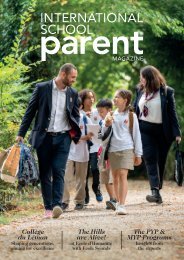International School Parent Magazine - Autumn 2023
Welcome to the Autumn Edition of International School Parent Magazine! Autumn is such a busy time – school is back in full swing, and Christmas seems to be right around the corner. As the leaves slowly start to change, we look forward to the cosy winter months, while our schools in the southern hemisphere look towards long summer days and warmer weather. Once again, we are thrilled to present to you a magazine filled with interesting and informative articles, exciting experiences, and practical tips for parents. The Autumn/Winter edition of International School Parent Magazine 2023 explores topical themes such as AI, and highlights some of the amazing initiatives led by schools in our community. We had the pleasure of interviewing Dr. Conrad Hughes, Director General of Ecole Internationale de Genève (Ecolint). In this piece, Conrad shares his passion for education and provides an insightful glimpse of Ecolint’s vision for education in the future. We also continue our discussion of children’s mental health, the impact of AI on our LGBTQI+ community, the importance of lifesaving first aid skills for children, and present many more interesting articles and commentary. Autumn is a wonderful time to enjoy the outdoors. Check out the article about the diverse activities on offer in Switzerland, special resources for children in the Zurich area, and learn about the stunning landscape of Interlaken. We remain committed to helping parents and children make the most of their international school experience. Have a wonderful autumn/winter period and we look forward to bringing you more content again in the spring.
Welcome to the Autumn Edition of International School Parent Magazine!
Autumn is such a busy time – school is back in full swing, and Christmas seems to be right around the corner. As the leaves slowly start to change, we look forward to the cosy winter months, while our schools in the southern hemisphere look towards long summer days and warmer weather. Once again, we are thrilled to present to you a magazine filled with interesting and informative articles, exciting experiences, and practical tips for parents.
The Autumn/Winter edition of International School Parent Magazine 2023 explores topical themes such as AI, and highlights some of the
amazing initiatives led by schools in our community. We had the pleasure of interviewing Dr. Conrad Hughes, Director General of Ecole Internationale de Genève (Ecolint). In this piece, Conrad shares his passion for education and provides an insightful glimpse of Ecolint’s vision for education in the future.
We also continue our discussion of children’s mental health, the impact of AI on our LGBTQI+ community, the importance of lifesaving
first aid skills for children, and present many more interesting articles and commentary. Autumn is a wonderful time to enjoy the outdoors. Check out the article about the diverse activities on offer in Switzerland, special resources for children in the Zurich area, and learn about the stunning landscape of Interlaken.
We remain committed to helping parents and children make the most of their international school experience. Have a wonderful autumn/winter period and we look forward to bringing you more content again in the spring.
Create successful ePaper yourself
Turn your PDF publications into a flip-book with our unique Google optimized e-Paper software.
toward specific things. It is important when<br />
a toddler is about to stick their fingers in<br />
a socket to keep them safe, it is short, fast,<br />
and effective. However, the word “no”<br />
is often overused in daily situations as a<br />
stopping word where a child is then left<br />
to think for themselves as to what now<br />
to do! For instance, when a child asks if<br />
they can watch tv and is met with a simple<br />
“no”, it becomes a blocking behaviour.<br />
Unfortunately, the child is then likely to<br />
persist in questioning, as they have not been<br />
provided with redirection. This can lead<br />
to escalation and meltdowns. Redirecting<br />
behavior in a positive and effective<br />
manner involves more than just saying<br />
“no.” It requires clear communication,<br />
understanding, and offering alternatives.<br />
Positive framing and offering alternatives.<br />
Instead of using a negative response like<br />
“no,” reframe your message in a positive<br />
light. For example, if someone is doing<br />
something you want them to stop, you can<br />
say, “I appreciate your enthusiasm, but let’s<br />
try doing it this way instead.” Alternatively,<br />
if they are met with “why don’t you go<br />
and draw or play Legos or build your fort<br />
instead”, they are now being directed to<br />
alternative activities which makes it more<br />
likely that they will give up on the TV line<br />
of questioning.<br />
Providing Choices. Empower children by<br />
providing options to choose from, so they<br />
feels more involved in the decision-making<br />
process. This approach fosters cooperation<br />
and engagement. For instance, you could<br />
say, “How about you choose between option<br />
A or B. What do you think?”<br />
“And” not “But”<br />
Instead of using “but”, which can negate<br />
the preceding statement, use “and” to<br />
add another positive aspect into the<br />
conversation. For example, you might<br />
say, “I like your idea, and I think we can<br />
make it even better by...”. This is a concept<br />
central to Dialectic Behaviour Therapy<br />
(DBT). The term “Dialectical” means<br />
trying to understand how two things that<br />
seem opposite could both be true. For<br />
example, accepting yourself and changing<br />
your behaviour might feel contradictory.<br />
However, DBT teaches that it’s possible for<br />
you to achieve both these goals together.<br />
By understanding dialectics, you start to<br />
see that there is more than one way to<br />
solve a problem and that two seemingly<br />
opposite ideas can be true at the same<br />
time. The simple summary of a dialectic<br />
in DBT is to remember the power of<br />
“AND”. People often try to provide positive<br />
feedback followed by constructive criticism.<br />
However, when we say, “you did a good<br />
job on your homework, but you could still<br />
do better”, that completely negates the<br />
positive statement and the child is left with<br />
the fact that they should do better, feeling<br />
disappointed. On the other hand, saying<br />
“you did a good job on your homework,<br />
and you could still do better”, validates both<br />
statements and leaves the child feeling more<br />
hopeful. Look at the differences between<br />
these examples:<br />
• I am disappointed in you, but I still love<br />
you > I am disappointed in you AND I still<br />
INTERNATIONAL SCHOOL PARENT AUTUMN <strong>2023</strong> | 33<br />
“The words “I love<br />
you” actually do<br />
not mean so much<br />
without the look or<br />
the touch, the hug<br />
or the tone.”<br />
love you.<br />
• I understand your point, but I am allowed<br />
to disagree with you > I understand your<br />
point AND I am allowed to disagree with<br />
you.<br />
• For those who are aware of the word<br />
“but”, they often try to replace it with<br />
various words to make it less negative, such<br />
as ‘however’, ‘nevertheless’, ‘conversely’,<br />
and ‘yet’ among others. These words have<br />
the same impact as “but” as they negate the<br />
previous statement. Using the word “and”<br />
will give you a positive outcome and a much<br />
more compliant child.<br />
I<br />
There are a few important points to<br />
consider here. When you find yourself


